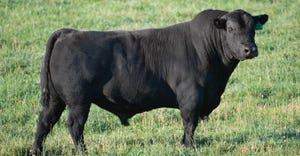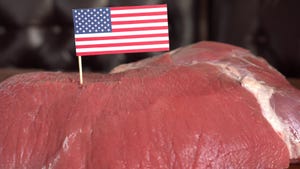What Is Nutrition’s Effect On The Fetus?
Results from recent research trials studying the effects of winter supplementation of beef cows on the subsequent performance of their offspring have been inconclusive
December 9, 2010

Results from recent research trials studying the effects of winter supplementation of beef cows on the subsequent performance of their offspring have been inconclusive.
These studies were each designed to test the hypothesis of fetal programming through the effects of maternal nutrition during the final months of gestation.
Maternal malnutrition is known to adversely impact offspring performance. On the contrary, maternal over-nutrition has been hypothesized to slightly improve growth performance and enhance carcass marbling and quality grade.
University of Nebraska (UN) researchers reported the results of a three-year study conducted at the Gudmundsen Sandhills Laboratory where Red Angus x Simmental cows were allowed to graze dormant Sandhills winter range (WR) or irrigated cornstalk residue (CR) with or without supplemental protein (SP). The SP, consisting of a 28% crude protein mix containing Rumensin® was fed to provide 1 lb./head daily from early December to late February.
Precalving cow body weight and body condition score (BCS) was increased by SP in WR and CR cows. CR cows were heavier at calving and had higher BCS than WR cows. WR cows not fed SP had the lowest BCS (4.75); all other groups had an average BCS of greater than 5.
Weaning weight of all calves was increased by SP in WR cows but not in CR cows. Feedlot average daily gain (ADG) of steer calves was not impacted by SP in either WR or CR cows. Slaughter and carcass weights of calves from WR SP cows were greater than WR non-SP cows, a carryover effect of heavier weaning weight.
Respiratory and digestive disease treatments in the feedlot were fewer in calves from SP cows. Marbling score and the percent of calves grading choice and high choice were also greater in calves from SP cows. These two observations could be indications of positive fetal programming.
Subsequently, UN researchers reported the results of a two-year study conducted at the Rex Ranch where mature composite cows grazing dormant winter range received either a higher (HS) or lower (LS) level of supplement for about 90 days prior to the beginning of calving. HS and LS were fed to provide 2.3 or 0.9 lbs./head/day of a 28% protein supplement, respectively.
The economically important traits of feedlot entry weight, feedlot daily gain and carcass weight were not different between progeny steer calves of HS and LS cows. However, similar to the first UN study, marbling score and the percentage of cattle grading high choice were higher in HS steers.
Oregon State University beef researchers studied the effects of late gestation supplementation of BCS 4.3 and 5.7 cows on subsequent reproduction and steer progeny feedlot performance. Both groups of cows grazed dormant meadow pasture and received meadow hay.
Supplemented cows were fed the equivalent of 2 lbs./day of dried distillers grains during the last third of gestation. Supplementation increased cow weight and BCS at calving of both groups of cows. BCS 5.7 cows weaned more calves and heavier calves and had a higher pregnancy rate than BCS 4.3 cows.
Weaning weight was increased by supplementation in both groups of cows. Feedlot performance, however, was not improved by supplementation. There were no differences in ADG, carcass weight or carcass traits resulting from supplementation.
The outcomes of these studies are intriguing but inconclusive. Late gestation supplementation of beef cows increased weaning weight in two of the three studies. While two studies showed an increase in marbling score and quality grade, no study reported an improvement in feedlot ADG.
This isn’t the consistency of response needed for an economic outlay. Feeding cows to a BCS of 5 to 6 at calving will optimize overall herd efficiency but likely not improve calf performance.
Read the full reports at
Scott B. Laudert, Ph.D., is a beef cattle technical consultant based in Woodland Park, CO.
You May Also Like

.png?width=300&auto=webp&quality=80&disable=upscale)

